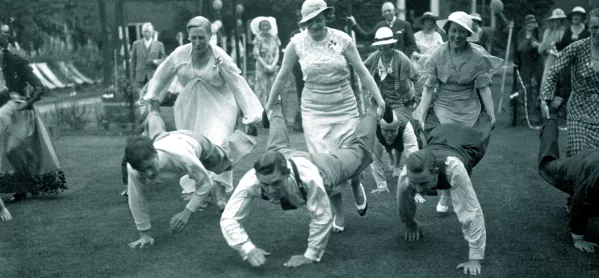
- Home
- Why games in lessons let down the pupils who need us most
Why games in lessons let down the pupils who need us most

In a recent Tes article, journalist and former teacher Dave Speck described the games he used to play with his MFL classes and expressed surprise that such game playing had fallen out of favour with many in the profession.
His conclusion is “I wouldn’t have survived as a teacher without games, partly because, for me, they were so effective in helping pupils to learn”
Quick read: Why we have no idea if most things in education work
Quick listen: How to train a teacher
Want more articles like this? Join our Tes Teaching and Learning Facebook group
As someone who started teaching around the same time as him, and who also embraced games in lessons at that time, I would like to explore how I came to reach a very different conclusion about the role of these kinds of games in the classroom.
Why do people play games?
In order to understand the problems with using games in lessons, we first need to understand why people choose to use them. Speck’s article focuses heavily on the use of games to hook and engage pupils; and especially pupils he seems to feel are hardest to reach.
These pupils are often boys and those pupils labelled as “disadvantaged”.
He also focuses on those pupils who are low prior attainers and placed in bottom sets, asking of those people who disagree that games form a useful part of most lessons. “...are the theorists out of touch, sitting in ivory towers - with little understanding of what it’s like to teach French to bottom set Year 8 in a tough school on a Friday afternoon?”
Why is game playing a problem?
Let us take a moment to consider that bottom-set Year 8 class in the tough school.
They are already behind their peers who, I assume from the context of his piece, are spending less time in their French class firing Nerf guns at the board or playing games based on The X Factor.
If those higher-attaining pupils are spending their lessons working and focusing on learning a subject while those lower-attaining pupils are playing games, how will the gap ever be closed, or even simply maintained at the current level? Those Year 8 pupils in the bottom set are only going to fall further behind.

This may, of course, be less of an issue if the games were chosen because they were genuinely the best way for a pupil to learn something, but even Speck admits that this is not always the case saying “...I’d select individuals to challenge me to the “Yes-No game” (made famous by Des O’Connor on Take Your Pick!) which, as we played it in English, had less to do with learning French than creating a happy and fun environment”.
There seems to be an assumption that competition from games will create this happy and fun environment and competition is often cited as a great way to motivate boys in particular.
However, this thinking, while seductive, may be flawed.
Mark Roberts, co-author of Boys Don’t Try?, says: “Using competition to “engage” boys seems like a natural thing to do. Appealing to boys’ competitive natures appears to be a common sense way to hook them into wanting to learn. The big problem is that boys who are unsuccessful in the games and competitions will suffer further blows to their self-esteem. And the boys who are most likely to lose are often the boys who are struggling academically in the first place.”
In his book, Roberts cites research from Martin Covington (1998) who suggests that, while some people will benefit from competition (the winners), all those who don’t win are likely to withdraw. After all, you can’t lose if you don’t try.
As well as bottom sets and boys, the other group who often seem to be the recipients of what we could term “game-based education” are those who come from disadvantaged backgrounds. How is this fair to our most disadvantaged communities?
Marc Rowland, author of Learning Without Labels, pointed out at April’s Durrington ResearchEd Conference that our most disadvantaged pupils are like the canary in the coal mine; they are the first to be affected by any problems in teaching.
Pupils from more affluent backgrounds might be able to afford to miss a lesson learning about the role of international trade blocs for a game of pass-the-parcel as there are more chances of these conversations happening at home. The most disadvantaged can least afford to have their time wasted in this way.
That last point isn’t purely theoretical; we can see the way disadvantaged pupils are affected by watering down the school curriculum if we look at what happened in France after they changed their primary schooling in 1989.
These changes are discussed in ED Hirsch Jr’s book Why Knowledge Matters where he explains their move from a system where everyone in the country followed the same academic curriculum to one where the curriculum was tailored to more individual interests.
The result? The school system stopped being one of the most equal in the world and those pupils from the more disadvantaged backgrounds started to perform significantly worse than those from more privileged backgrounds. Hirsch says “They systematically deprived poor children of the enabling knowledge that rich children had acquired from their home environments.”
Reading the research supporting Professor Becky Allen’s writing on Pupil Premium, it becomes clear that pupils from disadvantaged backgrounds are also more likely to benefit from teaching in calm environments that allow them to direct their attention on their learning. As professor Daniel T Willingham reminds us in Why Don’t Students Like School “Memory is the residue of thought”. If our attention is split, to the person firing a Nerf Gun or the unwrapping of a parcel to see who eventually has to answer a question, we find it more difficult to retain information.
We need to find strategies to support someone’s working memory, not throw new obstacles in their way,
What is the solution?
The motivation of people like Speck in promoting game-based education are, I’m sure, noble. Their aim is to motivate pupils and make the classroom a welcoming place for all. They hope, it seems, to trick them into learning what they need to be learn. A spoonful of sugar helps the medicine go down, after all.
If, as I think I have shown, these well meaning goals are going to be ill-served by the playing of games, then what do we do instead?
Firstly, I’d suggest rethinking the assumed direction of motivation inspiring achievement. Psychologist Nick Rose, in his chapter on Motivation in What Does This Look Like in the Classroom cites the work of Stephen Gorand (2012) who reviewed the evidence on the impacts of motivation and education outcomes and found little link. Instead, Rose suggests flipping the arrow and considering how outcomes may lead to motivation.
Rather than motivating pupils through playing games, we need to give them the chance to be successful in our subjects. We can do this through carefully pitching the level of challenge and then modelling and scaffolding to help them reach it.
Secondly, an important consideration is how we support our pupils’ working memory while they tackle these tasks. I would suggest having a look at the work of Gathercole (2007) and the strategies suggested by Jules Daulby of the Driver Youth Trust in her blog post on the use of mini-whiteboards.
Thirdly I would suggest we don’t patronise pupils and assume that because they are boys, or are in a “tough school” or bottom set, or from a disadvantaged background, that they can’t appreciate our subjects for what they are.
We do our pupils a massive disservice when we start from the position that they can’t possibly be interested in actually learning more about the world, fascinating aspects of history or how to solve a complex problem in maths.
Instead, let us pose intriguing questions and let their natural curiosity come to the fore. Provide them with the knowledge to tackle these questions and discover more. Inspire them with our own enthusiasm for learning. Not with the promise of extrinsic motivation coming in the form of a few sweets to the winners of a game.
Finally, if we are going to play games then make the learning front and centre. We need to ask, is it giving them opportunities to think hard about the topic and make connections between different things that they have learnt? Are they thinking about the subject or the game?
Speck makes an interesting leap in his article, writing “[Tim Jay, a professor of the psychology of education] recalls his own school days, when his geography teacher used to split the class into two halves for ‘a pop quiz’. But Mark Enser, who heads the geography department at Heathfield Community College, East Sussex, takes a very different stance”
No he doesn’t! He might question whether dividing a class in two is the best way to organise a pop quiz (how many pupils are really able to contribute? Do a few voices dominate?) but a pop quiz in small groups seems like a wonderful way to do some retrieval practice - the small group nature makes it low stakes and self-esteem is protected, pupils have the chance to quickly discuss why they think an answer is right or wrong and they are thinking hard about the subject.
Games, in the form of quizzes and competitions may have an occasional role to play in the classroom, but I would strongly challenge some of the assertions made by those who see games as a Good Thing in and of themselves and especially when they try to link it to a pedagogy especially suitable to the most disadvantaged. In these cases we are playing games with their lives.
Mark Enser is head of geography and research lead at Heathfield Community College, East Sussex. His first book, Making Every Geography Lesson Count is out now. He tweets @EnserMark
Register with Tes and you can read five free articles every month, plus you'll have access to our range of award-winning newsletters.
Keep reading for just £4.90 per month
You've reached your limit of free articles this month. Subscribe for £4.90 per month for three months and get:
- Unlimited access to all Tes magazine content
- Exclusive subscriber-only stories
- Award-winning email newsletters
You've reached your limit of free articles this month. Subscribe for £4.90 per month for three months and get:
- Unlimited access to all Tes magazine content
- Exclusive subscriber-only stories
- Award-winning email newsletters



